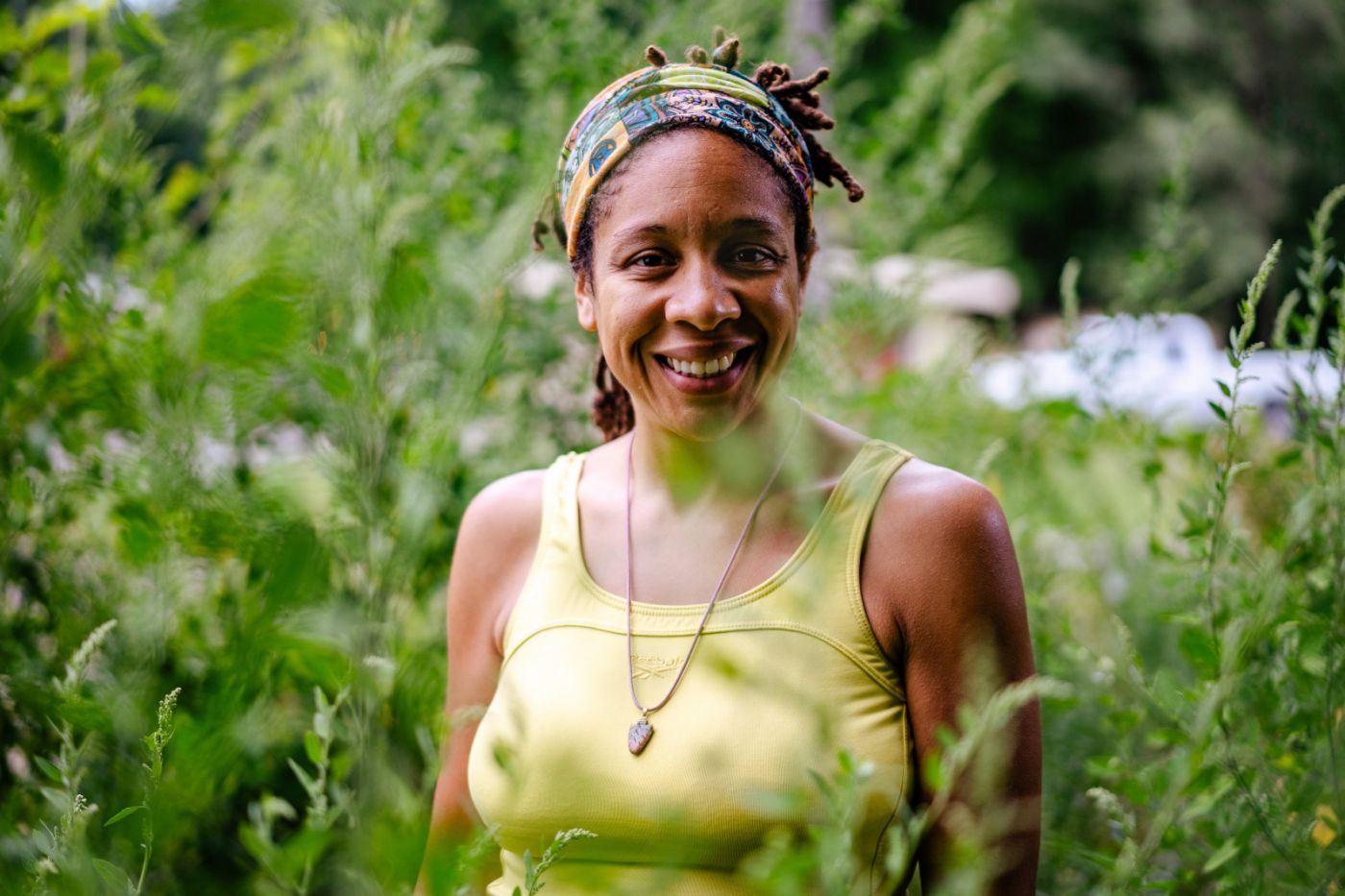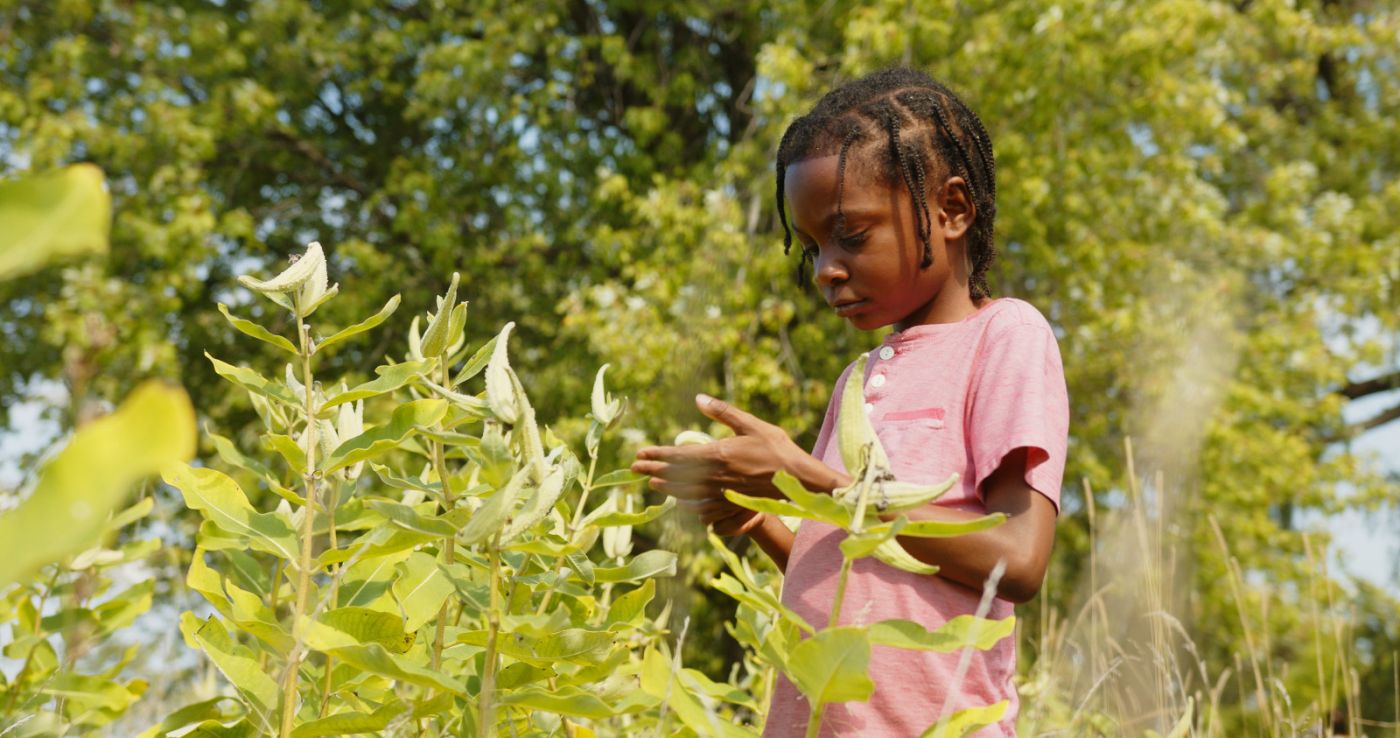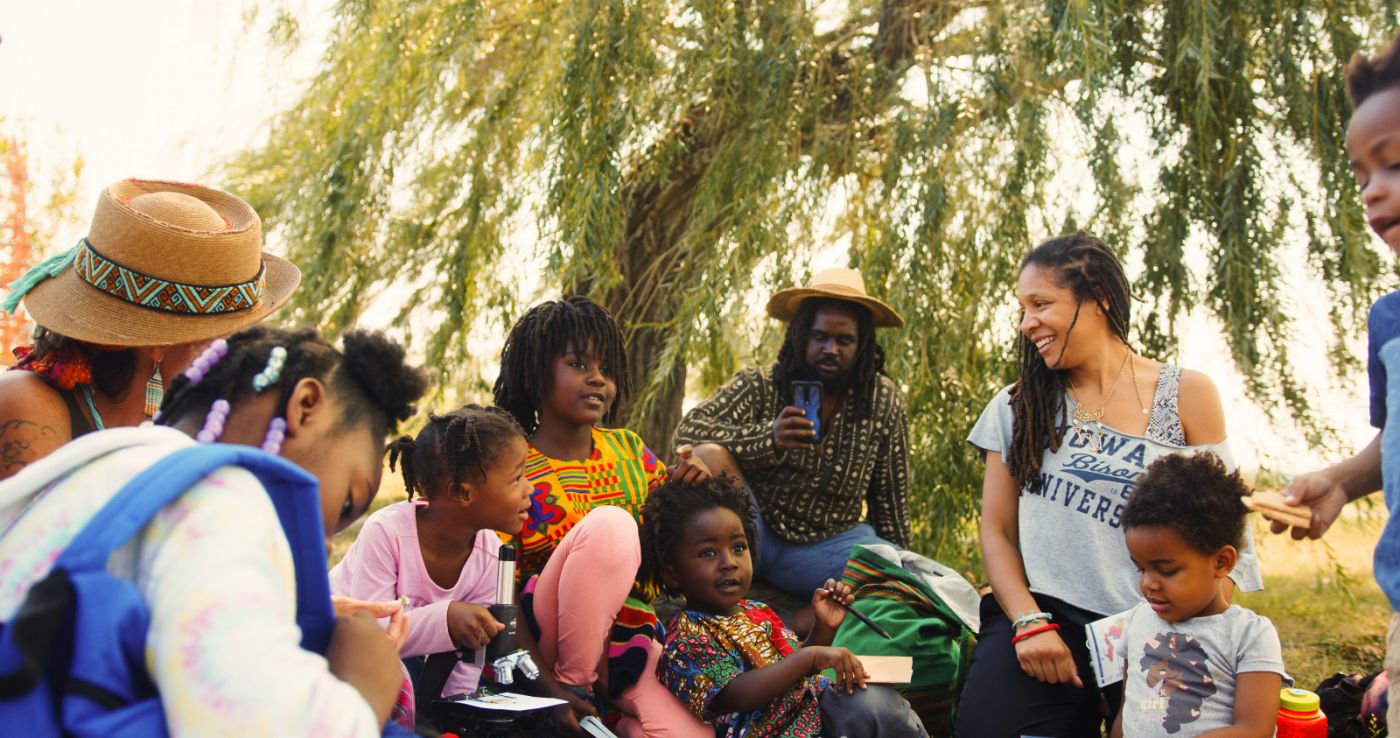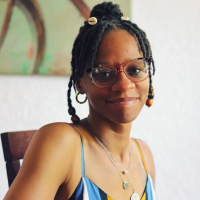Are You A Vanguard? Applications Now Open
Detroit Urban Forest School students identify plants on a field trip to Belle Isle. (Photo by Sarah Griffith)
Sarah Griffith
This is your first of three free stories this month. Become a free or sustaining member to read unlimited articles, webinars and ebooks.
Become A MemberThis story is published collaboratively with Planet Detroit as part of the Equitable Cities Reporting Hub for Environmental Justice, an initiative led by Grist and Next City.
Erin Preston-Johnson Bevel always loved being in nature. So she wanted to find a way to incorporate those benefits into her child’s education.
“You go into nature, and you’re there just receiving all this energy from the forest,” she said. “And [I’m] just wanting to bring that to Detroiters and our little babies.”
So Erin looked into the non-traditional schooling options that incorporate nature-based education available to her 5-year-old daughter. She hoped to find a curriculum more supportive of a flexible learning experience than what’s typically offered in local public school systems.
“[I wanted] to create a program that focused on open play in nature, open nature exploration, and learning STEM from the perspective of nature being the classroom,” she said.
She looked into Montessori and Waldorf, some of the most common teaching styles that allow for student-directed learning, but found that those options are often inaccessible or unaffordable for those in low-income areas.
So she started researching forest schools. An education concept with roots in Scandinavia and the U.K. as far back as the 19th century, forest schools began to gain a following in the 1990s in response to outcome-based education. But in searching for a local forest school, Erin found local options were predominantly white-led. She hoped to find something that centered around African politics and spirituality.
“I understand that as Black and brown people, we have a unique, special relationship to nature,” she said. “Our ancestors have always had this co-creation relationship with nature.”
Unschooling, which is a form of homeschooling, led to Erin’s inspiration for creating the Urban Forest School, which she and her daughter Souluna founded with the support of the Black to the Land Coalition.

Erin Preston-Johnson Bevel, founder of the Detroit Urban Forest School, in her Michigan-native garden. (Photo by Nick Hagen)
Erin describes the Urban Forest School as a “co-teaching and co-learning community.” Its mission, she says, is to “ensure through interaction, outdoor education and play that our children’s framing of the ever-present and ever-important relationship with nature is culturally grounded in our respective ancestral practices.”
The Urban Forest School launched in late 2020, starting with monthly outings such as hikes in local city parks, trips to a planetarium and plant identification programs. Erin requires parents to attend with their children to allow for a co-learning and co-teaching environment.
“A goal for me from the parent perspective is to be bringing together those parents who are looking for something that’s African- or Indigenous-centered and grounded,” Erin said. “I see it as us really wanting to build a community of parents that want to share the reverence of nature with their children.”
Parent shakara tyler, who uses lowercase letters for her name, shares that interest. She’s been attending the Urban Forest School since its founding. As a mother of six, with her youngest being a one-year-old, she said urban forest schools are important in teaching children about liberation and how to “decolonize our minds, bodies, and spirits.”
“A huge part of my liberation ideology just as a living being on this planet is my mothering, and just the obvious of me loving nature and me seeing myself deeply a part of nature and not separate than,” she said. “I believe it is my non-negotiable duty to restore my children’s relationship within that same frame – like understanding where we come from as a people, how the quote unquote ‘natural’ environment has been really critical to our worldview, to healing our health as individuals, as people, as families, as communities.”
Chris Jackson, a founding member of Black to the Land Coalition and supporter of the Detroit Urban Forest School, has sought opportunities to bring outdoor education to Black youth for much of his career as an educator.
For about 20 years, Jackson was a teacher at the African-centered school Nsoroma, where he taught yoga and various forms of meditation and brought kids outdoors regularly. The school was closed in 1999 when the school district came under state emergency management.
During the 1990s, Detroit had over 20 African-centered schools that provided an environment where curriculums and teachings rooted in white supremacy were decentralized, and instead provided children with learning experiences that were more relevant to their culture and history. There are now two existing African-centered schools in Detroit.
Jackson continued his career as an educator in charter schools, though he realized other schools were not as supportive of him building outdoor education in the classroom.
“Morning walks to start the day with fresh air in your lungs were not condoned,” he said.

Examining milkweed on a Detroit Urban Forest School field trip to Belle Isle. (Photo by Sarah Griffith)
Jackson now works as a camp coordinator with the Detroit Outdoors program, which aims to provide camping experiences for Black families. He says past efforts to bring outdoors into the education system have failed to gain traction in urban areas like Detroit.
“There was a big push in the early 2000s for adventure education and environmental science, but there hadn’t been a lot done, at least in urban areas, to bring curriculums and substance to schools,” he said.
Jackson imagined ways to create learning opportunities that center adventure education and environmental science in an outdoor curriculum for urban youth. He now brings those ideas to his job with Detroit Outdoors and his volunteer work leading Black to the Land Coalition events.
“We’re a collection of parents, community members, outdoor activists and enthusiasts,” he said of Black to the Land Coalition. “It’s allowed us to serve this community at a time when people needed to get outside and weren’t used to doing hikes and kayaking.”
At Black to the Land Coalition meeting in 2021, Jackson and other parents started discussing the idea of creating an Urban Forest School.
“We knew that getting outside was therapeutic and needed,” he said.
Erin intentionally incorporates reciprocity teachings into Detroit Forest School outings as a way to honor ancestral practices, like commemorations that introduce the concept of co-creation to young children and their parents. Groups in Urban Forest School often make earth altars with participants’ found items to demonstrate ”giving back” to the land.
“That’s a huge piece of the African and Indigenous frame that is completely missed by European-Americanized commodified nature,” she said. “And so the children can see the entire ceremony, they can see all these beautiful black people coming together and dancing and drumming and singing and offering.”
Forest School outings have included up to 40 attendees, with young children curiously exploring grassy areas, touching and engaging with native plants, and pointing out bees and butterflies.
tyler recalls attending an event and watching Erin’s daughter, Souluna, interact with the Stickwork sculpture at Eliza Howell Park. Souluna, she remembers, rubbed her face against the branches and slowly ran her fingers on them.
“She was really in tune in a way that I think she felt connected to this particular being,” she said. “I think in that moment, she was teaching me and reminding me that these branches are alive, and we can connect with them like we would connect with another living being.”
Some accessibility issues have caused coordinators to ensure that future events are located within the city and can be accessible by public transportation. Parents within the group often coordinate carpooling to ensure everyone can participate.

Detroit Urban Forest School members meet up on a field trip to Belle Isle, a 982-acre island park located in Detroit. (Photo by Sarah Griffith)
A recent Urban Forest School excursion included a hike through Detroit’s Eliza Howell Park, which led to a hidden forest featuring a bridge and trails along the Rouge River. Jackson, who spent the day prior mowing the grass to make a path for the young children and their parents, led the way, identifying plants for the group while highlighting the challenges of accessing local parks in Detroit.
“It’s important that we make sure we’re experts in our Rouge Park, Eliza Howell Park, or Belle Isle – the places that everybody can pretty much always gain access to,” Erin said. “Every learning experience doesn’t have to be in the classroom.”
Erin imagines growing the Urban Forest School, envisioning a “hyperlocal forest school network” incorporating African proverbs into the curriculum. As a full-time lecturer and unschooling parent, she wants to work with local Black and Brown parents and caregivers to bring their collective vision of culturally-rooted outdoor nature-based education to life.
“I’m like, ‘okay, how do I build this into a curriculum, to be more standardized and formalized so that we can offer it to more people?’” she said.
tyler hopes for a 2-3 day school structure that would offer an outdoor classroom setting in hours similar to a traditional school structure, allowing students to explore based on their individual interests and passions. She imagines the group engaging in travel to other cities, states, and countries that have Black and Indigenous urban forest schools.
“Just building those relationships with other groups that have similar frameworks and value systems and organizing in similar ways – maybe even unfamiliar ways. We’re just building those relationships so that we can learn and exchange resources.”
Erin poses the question: What are the needs of the community?
“[Nature’s] like the gift that our ancestors were able to sustain for us,” she said. “I just want to sustain it for our children.”

Rukiya Colvin is an award-winning, Detroit-based freelance writer and community organizer. They were Planet Detroit's 2021 Environmental Journalism Fellow and 2022 Energy & Environment Reporting Fellow. A lifelong east side resident of Detroit, Colvin has a deep-rooted passion for creating equity in their community. They hold a master’s degree at Wayne State University in urban planning with a concentration on housing and community development.
Nick Hagen is a freelance editorial and documentary photographer in Detroit, MI. See his work atnickhagenphotography.com
Sarah Griffith is a filmmaker based in the Detroit area.

20th Anniversary Solutions of the Year magazine